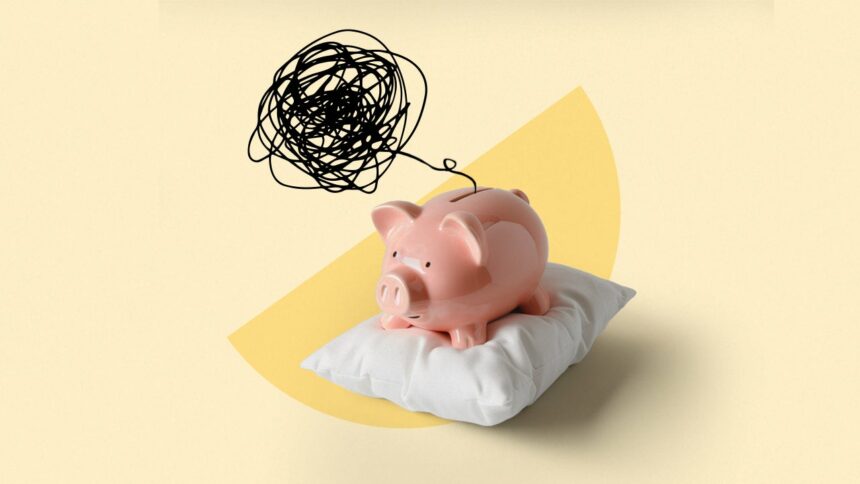Fraught with cussed inflation, excessive faculty prices and indicators of a cooling job market, at this time’s financial atmosphere has taken a toll on many younger Individuals’ well-being. Actually, 47 p.c of Gen Zers (ages 18-27) adults say cash has a detrimental affect on their psychological well being a minimum of often — together with emotions of tension, stress, worrisome ideas, lack of sleep and despair — in accordance with Bankrate’s Cash and Psychological Well being Survey.
Excessive bills typically imply little is left over after one’s payments are paid, which might result in “gentle saving” — a time period for the idea of spending cash for present-day enjoyment as a substitute of saving for the longer term.
Fortuitously, there are numerous methods younger adults can get pleasure from a full life whereas nonetheless spending inside their means and setting apart cash for the longer term.
Cash negatively impacts psychological well being of almost 1 in 2 Gen Zers
Almost half (47 p.c) of Gen Zers report cash has a detrimental affect on their psychological well being, a minimum of often, in accordance with Bankrate.
Gen Zers additionally mentioned different components have a detrimental affect on their psychological well being, akin to work, well being, present occasions, relationships and family obligations. Notably, nonetheless, almost 1 in 5 (18 p.c) Gen Zers mentioned nothing has an affect on their psychological well being.
Important percentages of most different generations reported cash negatively impacts their psychological well being:
- Millennials (ages 28 to 43): 50 p.c
- Era X (ages 44 to 59): 54 p.c
- Child boomers (ages 60 to 78): 40 p.c
In all, cash was essentially the most continuously reported issue having a detrimental affect on the psychological well being of Gen Zers, millennials and Gen Xers. Amongst child boomers, essentially the most continuously reported purpose was their very own well being (45 p.c).
Paying for on a regular basis bills causes Gen Zers essentially the most monetary stress
Of Gen Z adults who reported having cash considerations that negatively affect their psychological well being, essentially the most generally reported cash concern was inflation/rising costs, which was cited by 50 p.c. Different generally cited considerations included being in debt, not having a secure earnings/job safety, paying for on a regular basis bills and never having sufficient emergency financial savings.
Amongst these from different generations who famous cash negatively impacts their psychological well being, inflation was essentially the most cited stressor by millennials (69 p.c), Gen X (69 p.c) and child boomers (65 p.c).
Being many years out from conventional retirement, Gen Zers are much less possible than different generations to really feel stress over being ready for his or her golden years. Amongst these feeling detrimental impacts of cash on their psychological well being, 23 p.c of Gen Zers cited being unprepared for retirement or a low return on their investments as a priority.
Is gentle saving Gen Z’s reply?
When feeling overwhelmed by components akin to excessive prices of dwelling and pupil debt, younger folks typically resort to “gentle saving.” A development that lately went viral on TikTok, gentle saving entails utilizing one’s cash for present-day enjoyment as a substitute of saving it for the longer term.
By means of cautious planning and budgeting, nonetheless, one can discover methods to get pleasure from life at this time whereas nonetheless setting apart cash for emergencies and future monetary objectives.
Lauren Zangardi Haynes, a licensed monetary planner skilled, CIMA at Spark Monetary Advisors says the most important pitfall of sentimental saving is that you just’re giving up compounding. “[This] is simply one thing that individuals aren’t taught in class so that they actually don’t perceive. However once you’re youthful, you actually have to avoid wasting much less to satisfy your monetary objectives over time,” Zangardi Haynes provides.
Tammy Goodman, a licensed monetary planner at Tammy Goodman Monetary LLC, says that if somebody loves being outdoor, but they’re spending all of their cash on indoor sports activities leisure occasions, which may not align with what’s necessary to them.
“And a few individuals are snug spending cash in some ways and making an attempt to expertise all that they will,” Goodman says. “However then they get enlightened after they actually do a listing of the place their cash goes.”
Methods to get pleasure from life now and nonetheless save for the longer term
In at this time’s world, the idea of cash administration can simply really feel overwhelming. The excellent news is a few planning may help you get pleasure from your life whereas nonetheless saving cash, paying your payments and lowering debt. The next workout routines may help you strike a wholesome steadiness.
Create a funds
It could look like a frightening activity, however establishing a funds is step one in with the ability to afford your desires and wishes. A funds is a month-to-month spending plan that may be arrange utilizing pen and paper, a spreadsheet or a helpful budgeting app.
Widespread kinds of budgeting strategies embrace the 50-30-20 rule, which entails devoting set percentages of your month-to-month earnings to wants, desires and financial savings. One other technique that’s lately gone viral on TikTok is money stuffing, which entails placing set quantities of cash into envelopes to cowl every of your month-to-month expense classes.
Widespread classes included in a family funds embrace:
- Lease or mortgage funds
- Transportation (automotive fee, gasoline)
- Meals
- Utilities
- Insurance coverage premiums
- Bank card invoice funds
- Pupil mortgage funds
- Leisure
- Streaming providers
- Health club memberships
- Saving for emergencies in a high-yield financial savings account
“A funds units boundaries round your spending, and monitoring your spending towards that funds is a solution to maintain your self accountable,” says Greg McBride, CFA, Bankrate’s chief monetary analyst. “Budgeting and monitoring bills additionally show you how to establish areas the place cutbacks will be made, if wanted. A funds must be ‘written in pencil’ as bills commonly change, normally extra typically than earnings, so changes are frequent infrequently.”
Set monetary objectives
Monetary objectives can embrace deliberate purchases, debt compensation, having an emergency fund or saving for retirement. Whether or not you’re beginning your profession or nonetheless working in your schooling, your future monetary objectives might embrace:
- Saving for a down fee on a home or a automotive
- Paying off pupil loans or bank card debt
- Beginning a enterprise
- Retiring at a set age
No matter your monetary objectives are, determine how a lot you want to dedicate to them each month and add each as a line merchandise to your funds. As an illustration, chances are you’ll determine to create line gadgets akin to:
- Save $200 towards a automotive down fee
- Add $100 to your emergency fund
- Ship $100 further to pay down a bank card steadiness
Even when it’s gradual going, making progress towards such monetary objectives is certain to assist present peace of thoughts and inspire you to proceed in your efforts.
Set nonessential spending priorities
Determine which nonessential gadgets or experiences are necessary in your life proper now. Examples can embrace touring, effective eating or pursuing a passion. When you’ve outlined the issues price spending cash on, it may be simpler to determine whether or not any potential buy is finally price it.
Such nonessential purchases will be made with cash left over after you’ve lined your necessities akin to housing, transportation and different dwelling bills. Like your monetary objectives, put aside cash in your funds for the sort of spending.
“A funds ought to incorporate all bills — these incurred on an irregular foundation in addition to the discretionary, or enjoyable, stuff you spend on,” McBride says. “Holding your self accountable by monitoring spending is necessary as a result of if you happen to commonly go overboard on discretionary spending, will probably be a barrier to saving or a catalyst for high-cost debt.”
Backside line
At present’s financial challenges are hitting many customers exhausting — together with younger folks, who typically wrestle with excessive prices of dwelling, saving for a house and paying off pupil mortgage debt. As such, many are embracing the idea of sentimental saving by spending cash now as a substitute of saving for the longer term.
In the end, placing a steadiness between spending and saving is essential, and this entails making a categorized month-to-month spending plan. This helps you reside inside your means, with advantages of economic safety, lowered stress and extra peace of thoughts.











